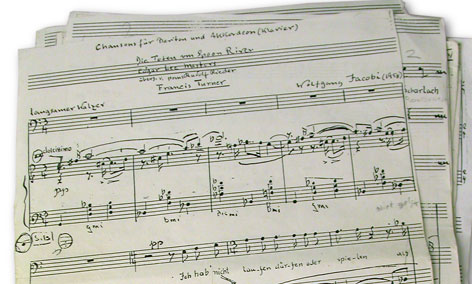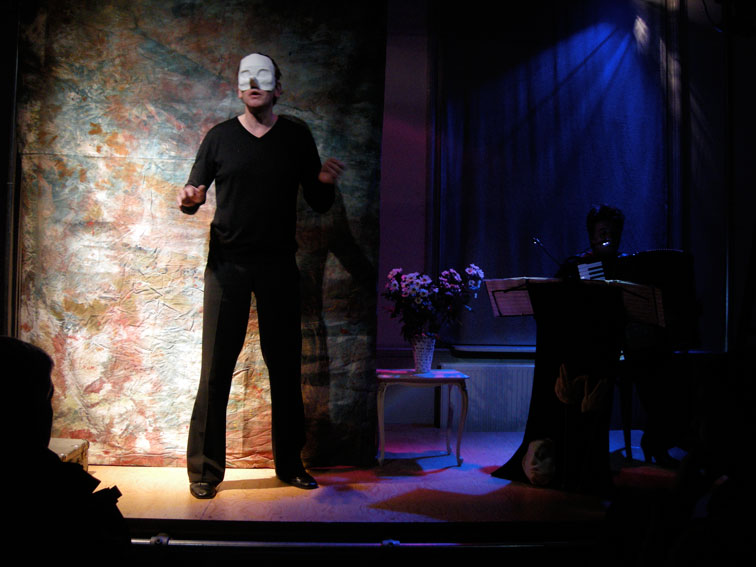
DIE TOTEN VON SPOON RIVER | meindert velthuis & marieke de vries (in german)
concert

four mini opera’s performed by meindert velthuis (baritone) and marieke de vries (accordeon) based on four poems from the spoon river anthology, a collection of epitaphs by the american poet edgar lee masters, translated in german by rudolf rieder and set to music by wolfgang jacobi. _han hazewindus : direction & masks
1. sam hookey
mp3 audio file
file size: 2,2 mb / dur: 1:35
german text by rudolf rieder:
ich lief von hause fort mit dem zirkus, / weil ich verliebt war in mademoiselle estralada, / die löwenbändigerin. / einmal nachdem die löwen / den ganzen tag gehungert hatten, / betrat ich ihren käfig und schlug auf brutus / und leo und zigeuner. / dann sprang brutus auf mich / und schlug mich tot. / beim eingang unter den schatten / traf ich einen, der mir fluchte / sagend, mir sei recht geschehen... / es war robespierre!
original poem by edgar lee masters:
i ran away from home with the circus, / having fallen in love with mademoiselle estralada / the lion tamer. / one time, having starved the lions / for more than a day, / i entered the cage and began to beat brutus, / and leo and gypsy. / whereupon brutus sprang upon me, / and killed me. / on entering these regions / i met a shadow who cursed me, / and said it served me right... / it was robespierre!

3. francis turner
mp3 audio file
file size: 4,2 mb / dur: 3:02
ich hab nicht laufen dürfen oder spielen / als knabe. / als mann durft ich nur an dem becher nippen, / nicht leer trinken— / denn scharlach hatte mein herz geschwächt. / und trotzdem lieg ich hier / seelig in einem geheimnis das nur mary kennt. / es ist ein garten, wo akazien stehn, / catalpabäume, süßumrankte lauben— / an jenem juninachmittag / bei mary sitzend— / ich küsste sie mit meiner seele auf den lippen, / da ist die seele plötzlich mir entflogen
i could not run or play / in boyhood / in manhood i could only sip the cup, / not drink— / for scarlet-fever left my heart diseased. / yet i lie here / soothed by a secret none but mary knows: / there is a garden of acacia, / catalpa trees, and arbors sweet with vines— / there on that afternoon in june / by mary’s side— / kissing her with my soul upon my lips / it suddenly took flight
ABOUT THE SPOON RIVER ANTHOLOGY | may swenson
the first notion of the spoon river poems probably came to masters in 1913 through william marion reedy, an editor, who gave him a copy of the greek epigrams from the greek anthology and suggested a series of verse epitaphs. _masters' immediate impulse to write his own anthology followed a visit by his mother. _their talk of the old days resolved him to give voices to the small-town dead and living as "characters interlocked by fate"
in spoon river, masters borrowed the mouths of the dead to give outlet to all his grudges, beliefs, indignations, insights, prophesies, discoveries of glaring injustice, revelations of life's mysteries and paradoxes – and his own eccentric philosophy
all in the cast are dead – "all, all are sleeping on the hill" of a midwestern cemetery – and from their graves they speak their own epitaphs, discovering and confessing the real motivations of their lives; they reveal the secret steps that stumbled them to failure, or raised them to illusionary triumphs while alive; it is as if the darkness of the grave granted them reveletory eyes for a recognition of their own souls
masters set down his 214 poerns over a period of some ten months, frequently writing "under a spell of such intensity that he lost all sense of time and was pulled back to the real world only by the coming of twilight at the end of each day". _horace gregory has remarked that it was not surprising that soon after the manuscript had gone to the publishers, masters collapsed and was dangerously ill...
the book was a succès de scandale, but its genuine merit was widely recognized. _seventy editions in almost as many languages followed. _he had torn the veil of respectability from small-town life
his ghosts freely gossip about each other and themselves, as well as about the private lives of neighbours still alive in their village. _few of the ingredients of human corruption and vulnerability are missing from the depositions of these underground witnesses, and the anthology remains fascinating if for nothing else than to untangle the lurid web of small town scandal provocatively placed before us. _much more than this, it can be read as a sociological treatise that graphically depicts the effects of industrialization on village life in late nineteenth and early twentieth century america
In his essay the genesis of spoon river, masters pointed out that of the 244 characters in the book:... there are nineteen stories developed by interrelated portraits... _practically every ordinary human occupation is covered. _when the book was put together in its definitive order, the fools, the drunkards, and the failures came first, the people of one-birth minds got second place, and the heroes and the enlightened spirits came last, a sort of divine comedy... _the names i drew from both the spoon river and sangamon river cemeteries, combining first names here with surnames there, and taking some also from the constitutions and state papers of iIllinois
masters' conceptual frame for the work was as startling to american readers of the time as was his form – a blunt free verse considered graceless by many of his critics. _the scandalous behavior of some of his characters, several of whom, under disguised names, were recognizable as influential figures lately dead or still living in the region, caused the book to become a notorious success – in fact, the first edition made more money for its author and its publisher than any previous volume of american poetry
edgar lee masters lies buried on 'the hill' in petersburg, next to his beloved grandparents. _the epitaph on masters' tomb, chosen by his loved ones, is taken from a poem he wrote called 'tomorrow is my birthday'
"good friends, let’s to the fields – i have a fever. / after a little walk, and by your pardon, / i think i’ll sleep. there is no sweeter thing, / nor fate more blessed than to sleep. _here, world, / i pass you like an orange to a child. / i can no more with you. _do what you will..."